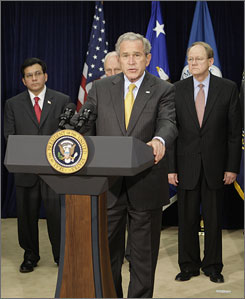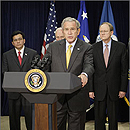Law widens govt's right to listen in
USA Today
Sun Aug 5, 2007
Area: Washington, DC (Hagerstown)
WASHINGTON - President Bush signed a bill Sunday that expands the government's power to eavesdrop without warrants on foreign suspects, even as Democratic leaders criticized the law and vowed to change it.
In signing the bill, Bush said the law gives investigators "greater flexibility while closing a dangerous gap in our intelligence gathering activities."
The new law gives broad power to the National Security Agency to collect intelligence without taking individual cases before a secret national security court established in 1978 by the Foreign Intelligence Surveillance Act.
Under the newly amended FISA Act, federal agents need only show that the suspect is likely to be outside the USA to begin surveillance of phone calls and e-mails that pass through the United States. The government would need to seek a warrant from the secret court once it becomes clear that the intercepted phone calls and e-mails involve a person in the USA.
Bush had secretly authorized warrantless wiretapping after the Sept. 11, 2001 terrorist attacks. The administration agreed in January to obtain warrants from a FISA court and pressed Congress to change the law.
In a letter to the House Judiciary Committee, House Speaker Nancy Pelosi said "many provisions of this legislation are unacceptable." The speaker, who voted against the bill, asked the committee to draft a new bill "as soon as possible after Congress reconvenes."
The law expires in six months, but Pelosi said she did not think "the American people will want to wait that long before corrective action is taken." Senate Majority Leader Harry Reid also promised to revisit the law, which has provoked widespread outrage from civil liberties groups who said it would impinge on Americans' privacy.
"A campaign of fear and misinformation has spread on Capitol Hill that needs to be stopped," said Anthony Romero, executive director of the American Civil Liberties Union, which opposed the new law.
Some Democrats complained that the law gives too much authority to National Director of Intelligence Mike McConnell and Attorney General Alberto Gonzales without enough judicial oversight. In a letter to Reid Thursday, Senate Democrats Russ Feingold of Wisconsin and Robert Byrd of West Virginia and Independent Bernie Sanders of Vermont said Gonzales had proven unworthy of such trust.
"It does not contain adequate safeguards to protect the rights of Americans," they wrote. "Congress is treading into new territory with this proposal, and it is essential that we make clear to the executive branch and the FISA court that Congress wants strict controls on any new surveillance authorities that could involve eavesdropping on people in the United States."
Reid and Democrats agreed that FISA needed updating to deal with new technologies but had supported a bill introduced by Democratic Sens. Jay Rockefeller of West Virginia and Carl Levin of Michigan. That bill said intelligence agencies could intercept calls between foreign parties but would have to seek a warrant from the FISA court if the foreign target began communicating with someone in the USA.
"Rather than pass this bill, my Republican colleagues chose to rubberstamp a flawed administration proposal," Reid said.
During the floor debate Friday, Rep. Lamar Smith, R-Tex., the ranking Republican on the House Judiciary Committee, said it was a "pitiful sight" to see Democrats arguing against giving McConnell the "tools he needs to protect our country from terrorist attacks."





 Share your thoughts in the Forum
Share your thoughts in the Forum